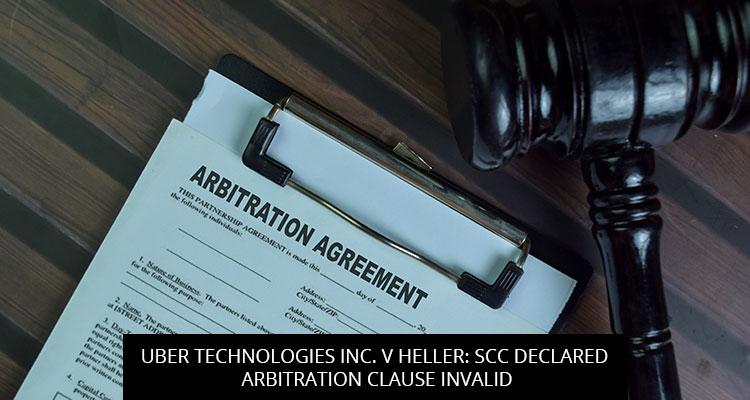An Attempt To Improve The Overall Mechanism Of Standard Form Contracts
Overview
Heller is the representative plaintiff in a class action lawsuit brought by Ontario Uber drivers alleging they are “employees” and not “independent contractors”, Uber has violated the Employment Standards Act, 2000, SO 2000, c 41 (“ESA”) guidelines, and as such, Uber drivers are entitled to the minimum benefits guaranteed to employees under the ESA.
The class action also involved a challenge to deal with a part of the standard form contract called as the “arbitration clause”. This part of the contract said that any disputes with the company would be subjected to arbitration in Netherlands as the agreement was governed by the laws of Netherlands [dealt as per the rules of International Chamber of Commerce’s (ICC) rules] and the matter cannot be taken up to the court. When Heller signed the contract, he had no idea that arbitration would cost him a hefty amount as the contract did not specify the arbitration costs.
When the class action commenced, Uber moved to stay the class proceeding in favour of arbitration in the Netherlands, pursuant to the arbitration clause in its BV Terms and Conditions. In its June 2020 decision, the SCC addressed some preliminary issues as to whether the action should have stayed; whether the validity of the arbitration agreement should be decided by court or arbitrator; and whether the arbitration agreement was unconscionable.
The Highlighting Effects Of Heller V Uber On Ontario Employment Practices
Other than expanding on the scope of arbitral referral exceptions, the SCC also expanded on unconscionability as a “corrective to the harshness of the common law” (McCamus, John D. The Law of Contracts, 2nd ed. Toronto: Irwin Law, 2012).
The Role Of Doctrine Of Unconscionability
Unconscionability is an equitable doctrine used to set aside unfair agreements resulting from an inequality of bargaining power.
Determination Of Unconscionability
The test for Unconscionability requires:
(1) proof of inequality in the bargaining positions of the parties, and
(2) evidence of an improvident bargain.
Keeping in mind the above-aforementioned factors, the arbitration clause was declared unconscionable, unfair, and invalid in Heller’s claim. With respect to the first aspect of the doctrine of unconscionability, Heller had no power to negotiate the contract as it was standard form contract. An inequality of bargaining power exists when one party cannot adequately protect its own interests in the contracting process and a bargain is improvident if it unfairly benefits the stronger party or unjustifiably disadvantages the weaker party.
With respect to the second aspect, improvidence implies a more contextual and theoretical meaning. The finding of unconscionability in such contracts can be declared when the stronger parties are unduly taking advantage of the weaker party’s lack of understanding of the contractual terms.
Finally, the court suggested that rendering the arbitration part valid would limit Heller’s contractual rights. The improvidence prong in the unconscionability doctrine solidified Heller’s claim as the arbitration costs were approximately equal to Heller’s annual income.
The many ways in which employment contracts demonstrate inequality of bargaining power is well-documented, as is the potential to enhance an employer’s advantage at the expense of the employee’s vulnerability. As the majority noted in their decision, almost any agreement will be an improvement over the status quo for a person who is in desperate circumstances.
Employers should refrain from using boilerplate illusory arbitration clauses and refrain from incorporating ambiguous terms intentionally drafted as being not quite a penalty clause and not quite an exemption clause.
Moreover, any contractual clause that blocks access to statutory relief or access to justice may be found unconscionable and invalid. In particular, subsection 5(1) of the ESA states, “… no employer or agent of an employer and no employee or agent of an employee shall contract out of or waive an employment standard and any such contracting out or waiver shall be null and invalid.”
Respect For Arbitration Was Untouched In Heller
The court conclusively highlighted the respect for arbitration in a much broader picture by declaring that arbitration is an accessible and pragmatic way of resolving disputes by keeping it cost-effective and not cost-intensive. Arbitration demands the fulfilment of accessibility, flexibility, and efficacy which was clearly lacking in pronouncing the arbitration clause valid in the Heller’s case.
Conjunctively, the decision in Heller raises the question of whether it would have been different if the arbitration clause had specified that the arbitration would take place virtually in the same country as the driver, and that the commencement fee would be fully refundable in the event that the claimant prevailed, or even if the ICC rules and fee schedule had been explicitly attached to the agreement and made clear to the driver. The arbitration clause may have been modified in a variety of various ways to make sure that arbitration offered a practical and approachable means of resolving conflicts.
Our Skilled Lawyers Can Guide You!
If you have any questions regarding the validity and enforceability of contracts, please get in touch with lawyers at Ayaz Mehdi Professional Corporation.
Disclaimer: Kindly note that sending or receiving information through this site does not establish a solicitor-client relationship. Legal matters are fact-specific, and the law is variably changing. The views expressed and the content provided on this blog are general guidelines and cannot substitute for proper legal advice. Schedule your legal consultation by clicking here: Let’s meet!







